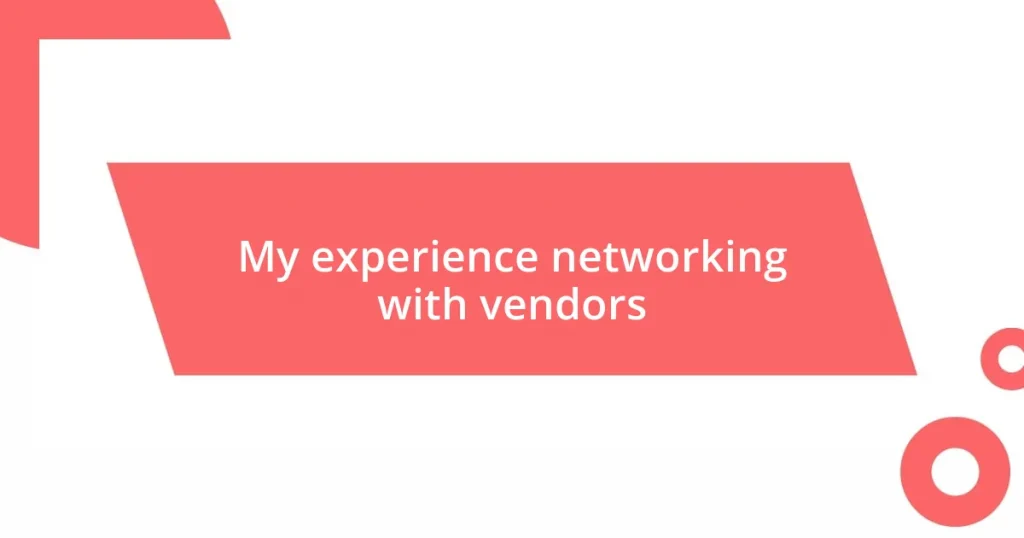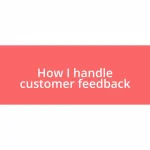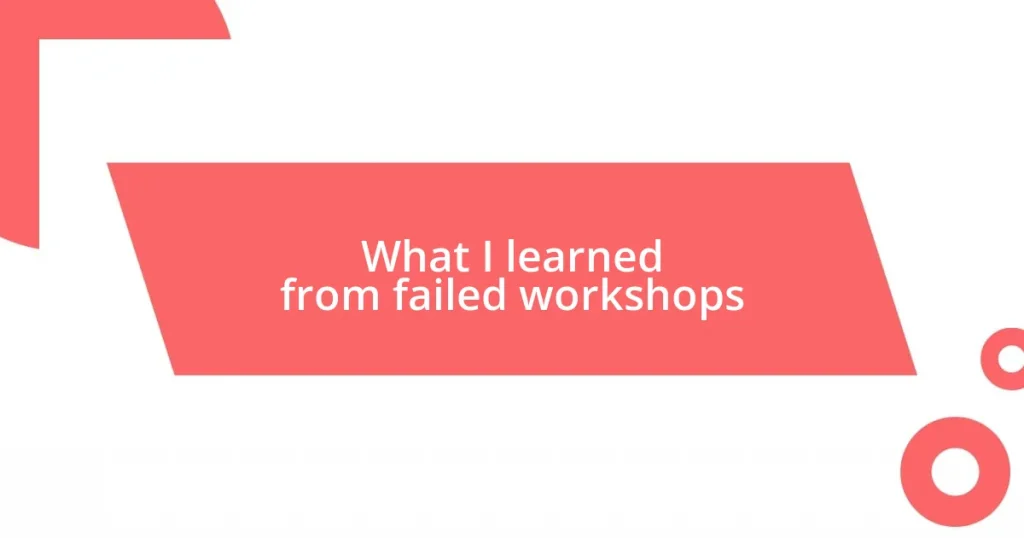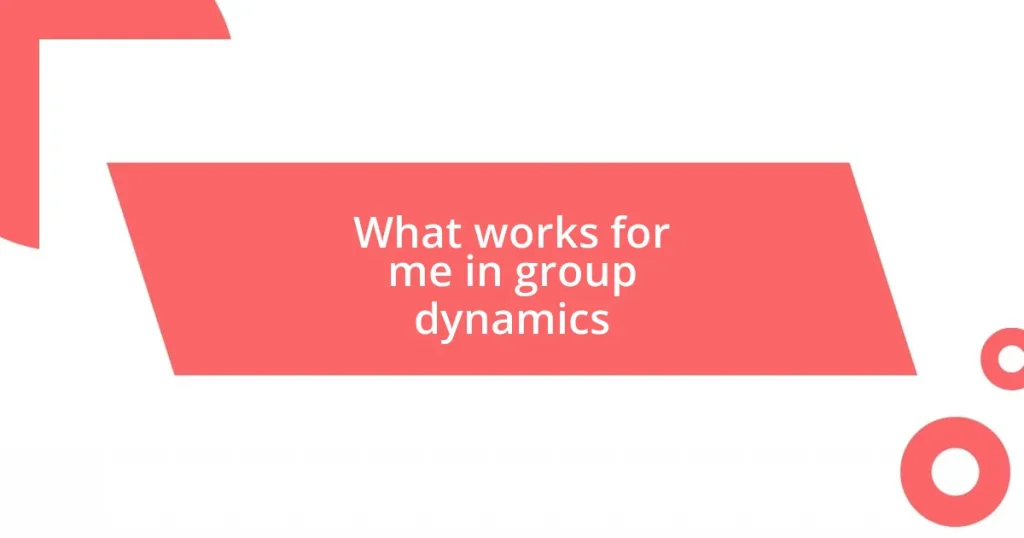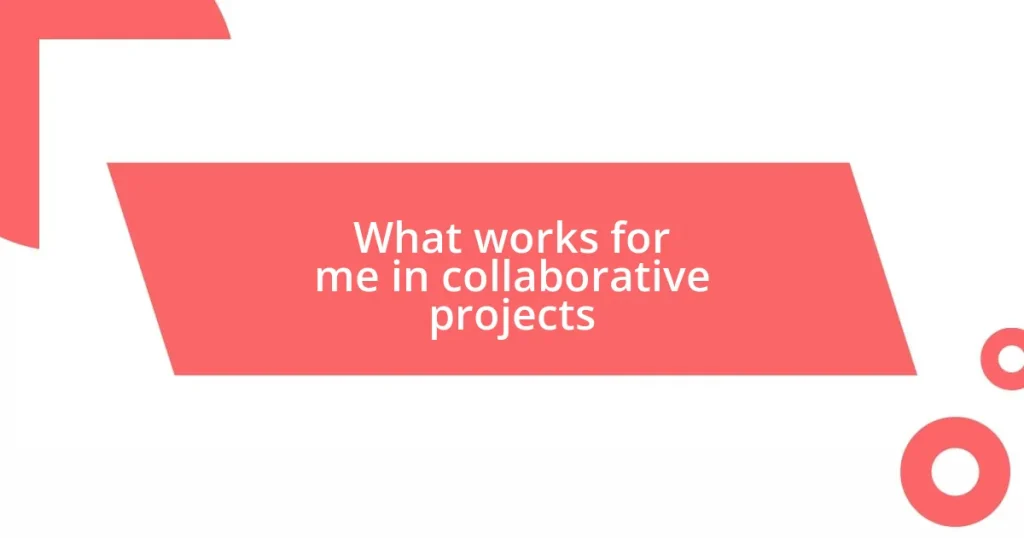Key takeaways:
- Networking with vendors fosters genuine relationships, leading to tailored solutions and valuable industry insights.
- Preparation for vendor meetings, including research and clear objectives, enhances productive dialogue and builds strong connections.
- Regular communication and sharing personal stories humanize vendor relationships, transforming transactions into partnerships.
- Timely follow-ups and providing value strengthen connections, turning networking efforts into long-term business growth opportunities.
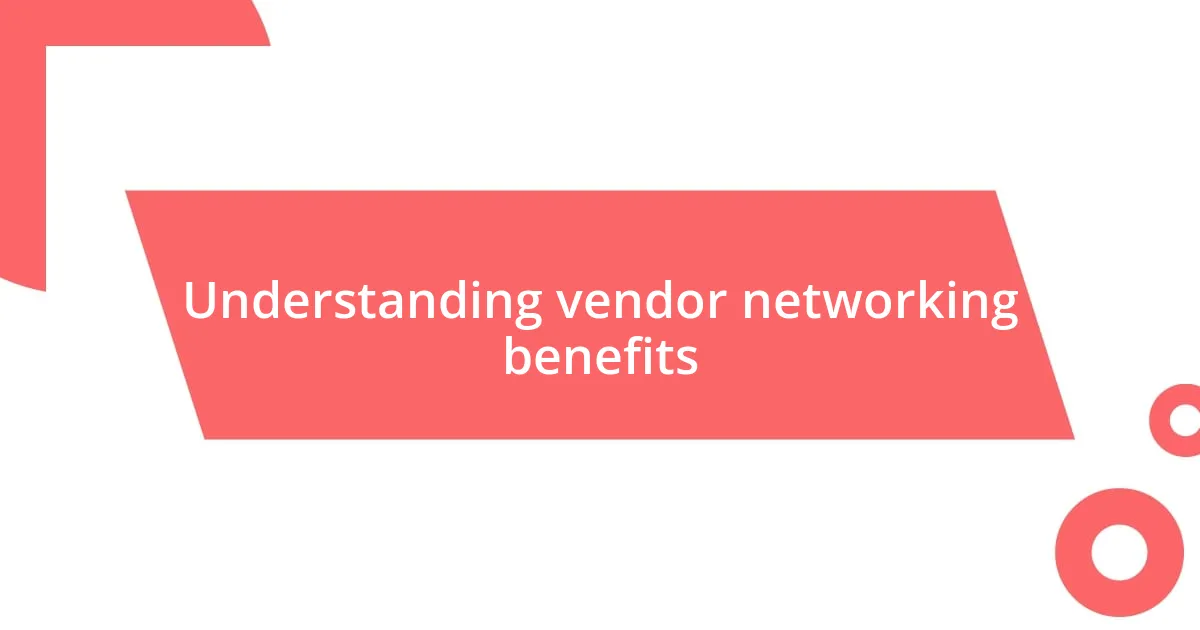
Understanding vendor networking benefits
One of the most rewarding aspects of networking with vendors is the opportunity to build genuine relationships. I remember attending a local trade show where I struck up a conversation with a vendor who had a similar passion for sustainable products. This connection not only led to valuable insights about eco-friendly materials but also resulted in ongoing collaborations that enriched my own projects. Isn’t it amazing how a simple conversation can spark a partnership that feels mutually beneficial?
Getting to know vendors personally opens up channels for honest communication. I often find that when I have a solid rapport with a vendor, I can discuss my needs more openly, leading to tailored solutions that perfectly fit my requirements. Have you ever thought about how understanding a vendor’s personal story can impact your business decisions? For me, it has meant discovering unique products and negotiating better deals that are based on trust rather than just transactions.
Moreover, networking with vendors can provide a wealth of industry knowledge that sometimes feels like having a backstage pass to insights others may miss. After connecting with several vendors over the years, I often realize they play a pivotal role in keeping me updated on market trends and emerging technologies. It’s like having experts in my corner who are generous with their knowledge. Isn’t that a valuable resource to leverage as we navigate the complexities of our respective industries?
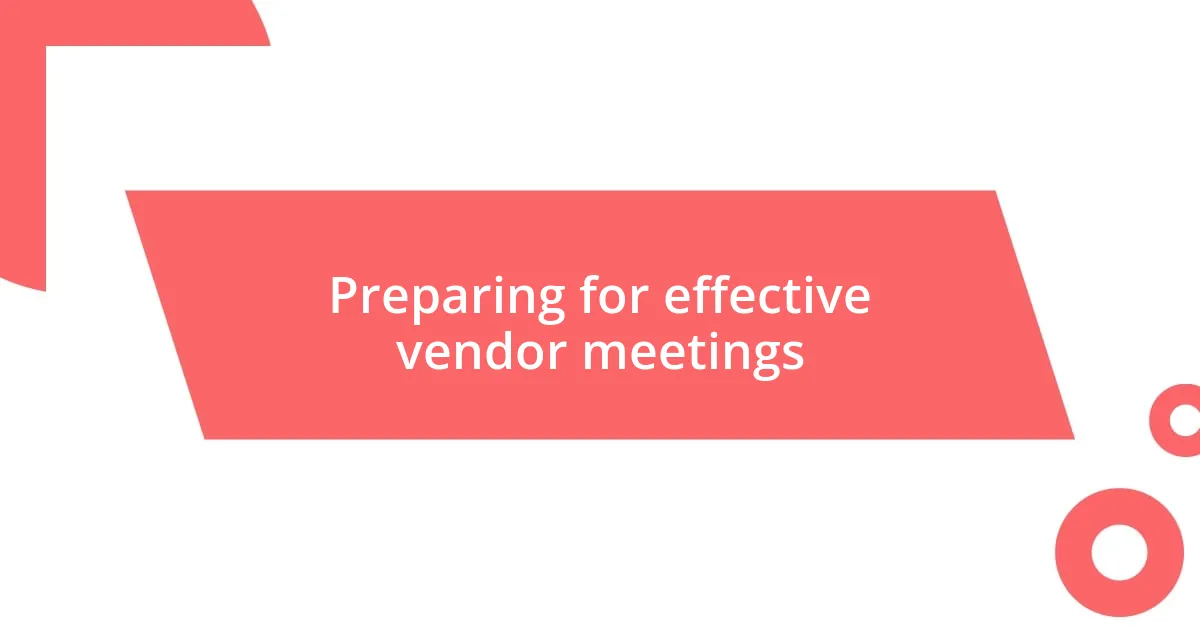
Preparing for effective vendor meetings
Preparing for an effective vendor meeting requires thoughtful planning. I learned this firsthand when I was preparing for a crucial discussion with a vendor who had a fantastic reputation in our industry. I meticulously compiled a list of questions and points I wanted to address, making sure to focus on how their offerings could specifically benefit my project. That preparation ensured that I made the most of our limited time together and helped establish a productive tone right from the start.
To enhance your vendor meeting experience, consider the following tips:
- Research the vendor: Familiarize yourself with their products, services, and recent company news. Understanding their current challenges or successes can spark more meaningful conversations.
- Set clear objectives: Know what you want to achieve from the meeting. Whether it’s a potential partnership, new product insights, or just establishing a relationship, having a clear goal guides the discussion.
- Prepare supporting materials: Bring along relevant documents, charts, or samples that can illustrate your points. Visuals can often communicate complex ideas more effectively than words alone.
- Practice active listening: This isn’t just about presenting your information; it’s equally important to genuinely listen and engage with what the vendor has to say. Their feedback can lead to unexpected opportunities.
- Follow up after the meeting: A brief email thanking them for their time and summarizing key points can reinforce the connection and keep the conversation going.
By taking these steps, I feel more confident entering vendor meetings, and it really enhances the relationship-building process. The right preparation not only makes each meeting smoother, but it also allows room for authentic dialogue that can lead to incredible opportunities down the line.
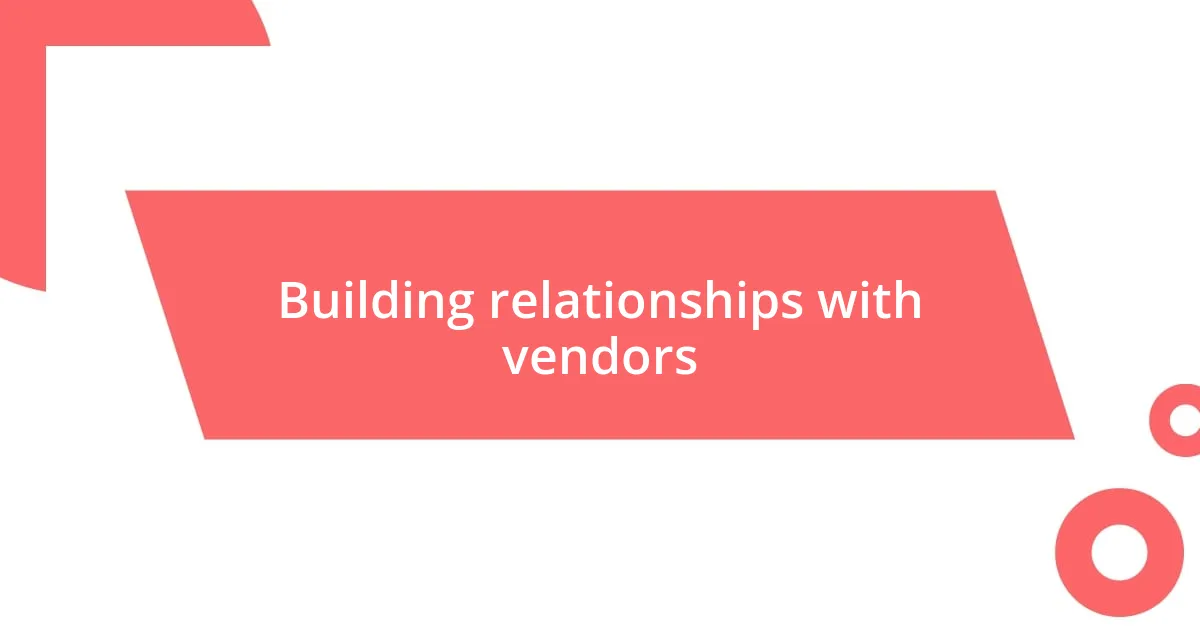
Building relationships with vendors
Building relationships with vendors is truly an art that combines strategy and sincerity. I remember one instance when I attended a panel discussion where a vendor shared their journey of starting from scratch in a competitive market. Listening to their story made me appreciate the effort behind their products; it wasn’t just about business for them; it was personal. This experience taught me that sharing life stories can humanize our interactions and foster deeper connections.
I’ve found that regular communication is key to nurturing these relationships. After securing a deal with a vendor, I took the time to check in and ask about their successes and challenges. It wasn’t just about my needs anymore; it became a two-way street. Engaging with them on a personal level transformed our transaction-centric relationship into a collaborative partnership, where we could support each other’s growth. Have you ever wondered how a simple message can lead to stronger ties with a vendor? For me, it has opened doors to exclusive offers and a network of industry contacts I wouldn’t have met otherwise.
Furthermore, attending networking events can solidify these bonds. I vividly recall a vendor commenting on my booth setup during an expo. We talked about our approach to marketing and discovered we shared similar philosophies. That moment of shared understanding has since led to collaborative marketing efforts that have benefitted both of our businesses. Experiences like these remind me that building relationships isn’t a one-time effort but a continuous journey that evolves.
| Strategies for Building Vendor Relationships | Benefits |
|---|---|
| Share Personal Stories | Fosters trust and empathy |
| Regular Communication | Enhances collaboration |
| Attend Networking Events | Opens up new partnerships |
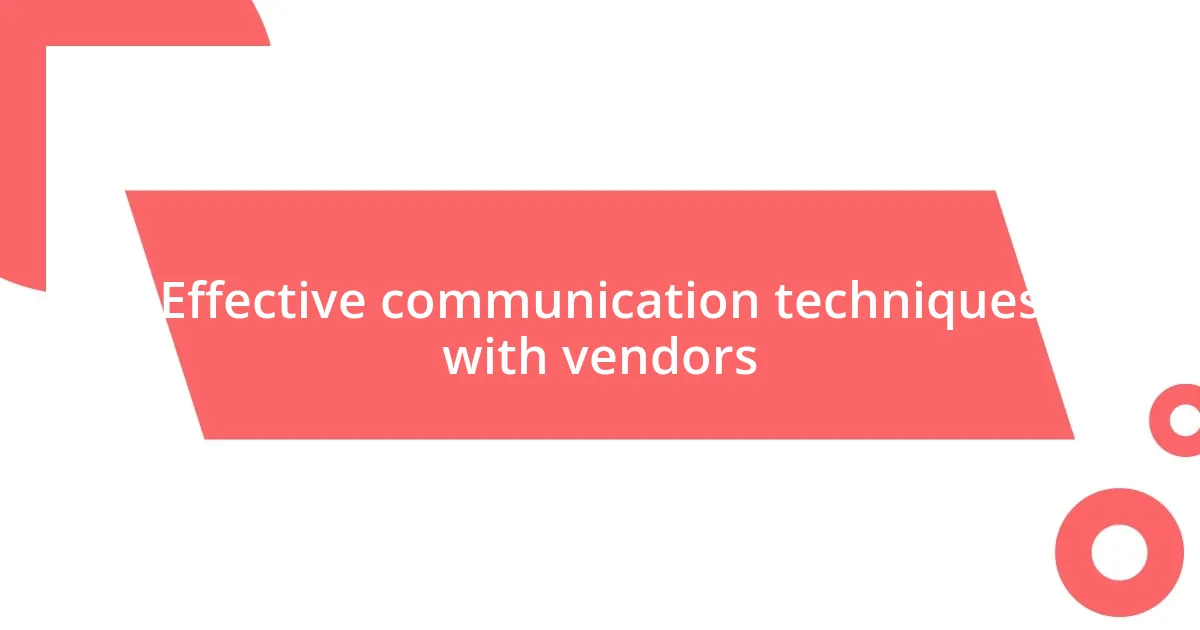
Effective communication techniques with vendors
Communicating effectively with vendors is essential for any successful partnership. I remember when I first started working closely with a vendor; I struggled with sharing my needs clearly and ended up feeling frustrated. I learned that using straightforward language and being transparent about my objectives not only clarified my intentions but also made the vendor feel more inclined to assist me. Have you ever noticed how openness can elevate conversations? Once I adopted that approach, it dramatically transformed our interactions.
Another technique I found invaluable is using questions to guide discussions. When I engage with vendors, I typically start by asking open-ended questions about their services, which encourages them to elaborate and share insights. For instance, during a meeting with a software vendor, I posed a simple question about how their product could solve specific challenges I was facing. Their detailed response not only provided me with solutions but also sparked a dynamic conversation, highlighting new features I had no idea existed. This kind of dialogue fosters a collaborative atmosphere, making me feel like we are working towards a shared goal.
Lastly, I’ve discovered the power of non-verbal communication, such as body language and tone of voice. I recall a situation where I was discussing a sensitive issue with a vendor. Initially, I kept my tone quite serious, which made the atmosphere tense. However, as I relaxed and adopted a more friendly demeanor, the vendor mirrored my attitude. Suddenly, the conversation flowed so much more smoothly, allowing us to tackle the topic without defensiveness. Have you experienced the difference a change in tone can make? It’s fascinating how our non-verbal cues can either bridge or create gaps in communication.
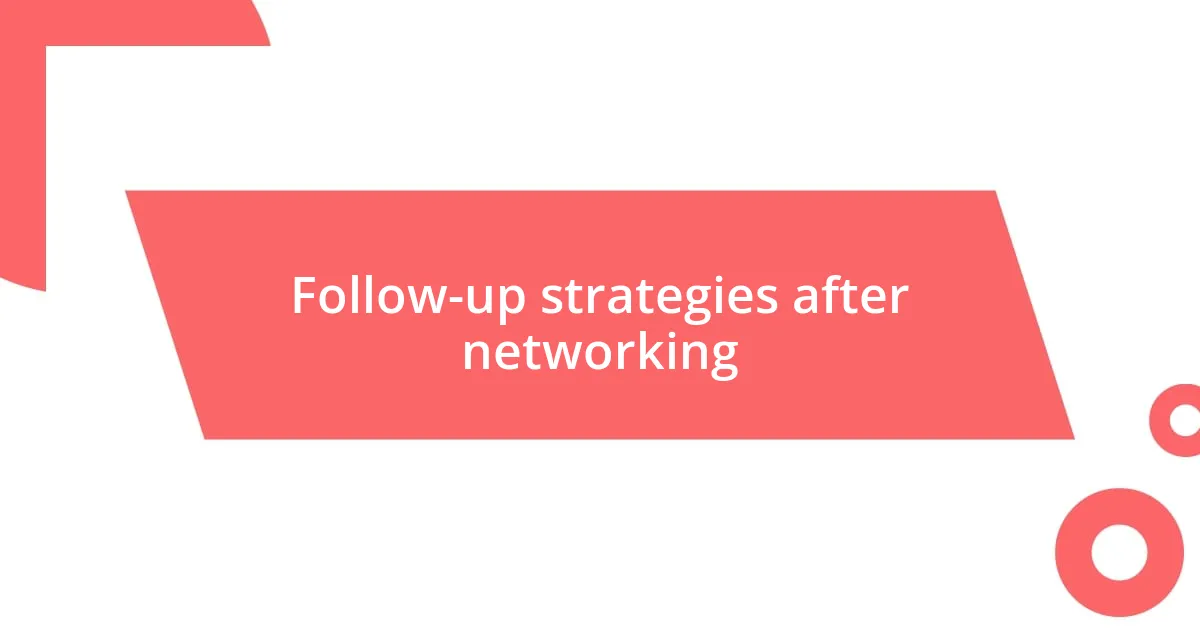
Follow-up strategies after networking
After networking, I believe that timely follow-up is crucial for solidifying connections. One time, after a particularly engaging conversation with a vendor at an event, I sent them a quick message the next day. I expressed my appreciation for their insights and mentioned a specific point that resonated with me. This simple gesture not only reinforced our discussion but also reminded them of the personal connection we established, and it led to further conversations about potential partnerships.
One strategy I’ve found effective is to provide value in my follow-up. For instance, I once followed up with a vendor by sharing an article that related to a pain point they’d mentioned during our chat. It might seem small, but it showed that I was genuinely interested in their challenges, not just making a business connection. This act of sharing created an impression that I was a thoughtful partner, and it opened up a dialogue where they felt comfortable bringing up future opportunities.
Moreover, I like to schedule regular check-ins to keep the relationship vibrant. A few months back, I set aside time for a casual coffee chat with a vendor I respected. During our meeting, we shared updates and brainstormed potential collaborations. This proactive approach not only showcases my commitment but also fosters a relaxed environment for honest discussions. How do you think a consistent touchpoint could change your vendor relationships? For me, it has transformed mere contacts into trusted allies.
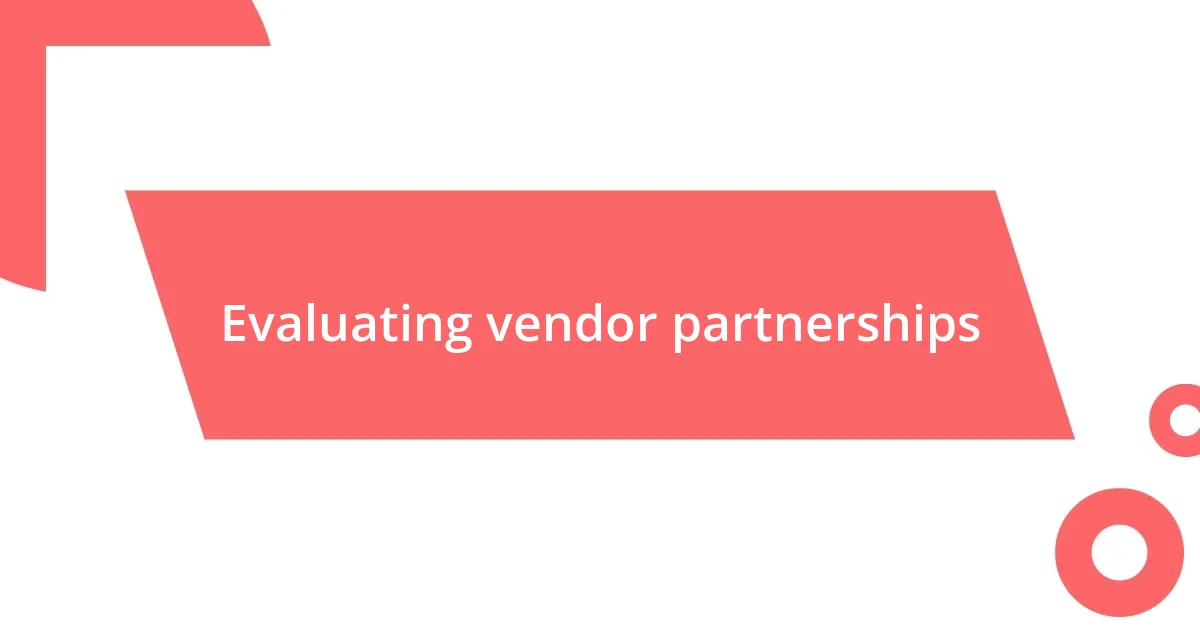
Evaluating vendor partnerships
Evaluating vendor partnerships is a vital step in ensuring long-term success, and my approach has always been to look beyond just the numbers. I remember a time when I partnered with a vendor who seemed perfect on paper, but as we collaborated, I realized their values didn’t align with mine. This misalignment caused friction and stress for both parties, teaching me that understanding a vendor’s culture is just as important as their service offerings. Have you ever felt that disconnect in a professional partnership?
In my experience, focusing on performance metrics has been enlightening. During a project with a marketing vendor, we established clear KPIs to assess our progress. Surprisingly, not all vendors are comfortable with this transparency; one vendor I worked with hesitated to share data, which raised red flags for me. I learned that a willingness to be accountable and provide measurable outcomes is essential. It’s a two-way street: if you’re open about your expectations, it encourages vendors to reciprocate.
Additionally, I find it incredibly beneficial to solicit feedback from team members who interact with vendors daily. For example, I once gathered insights from my team after a project concluded. Their perspectives revealed nuances I hadn’t considered, particularly regarding communication and responsiveness. This collective evaluation provided not just a holistic view but also allowed us to celebrate successes and address concerns together. Isn’t it interesting how a team’s input can shape the dynamics of a vendor relationship?
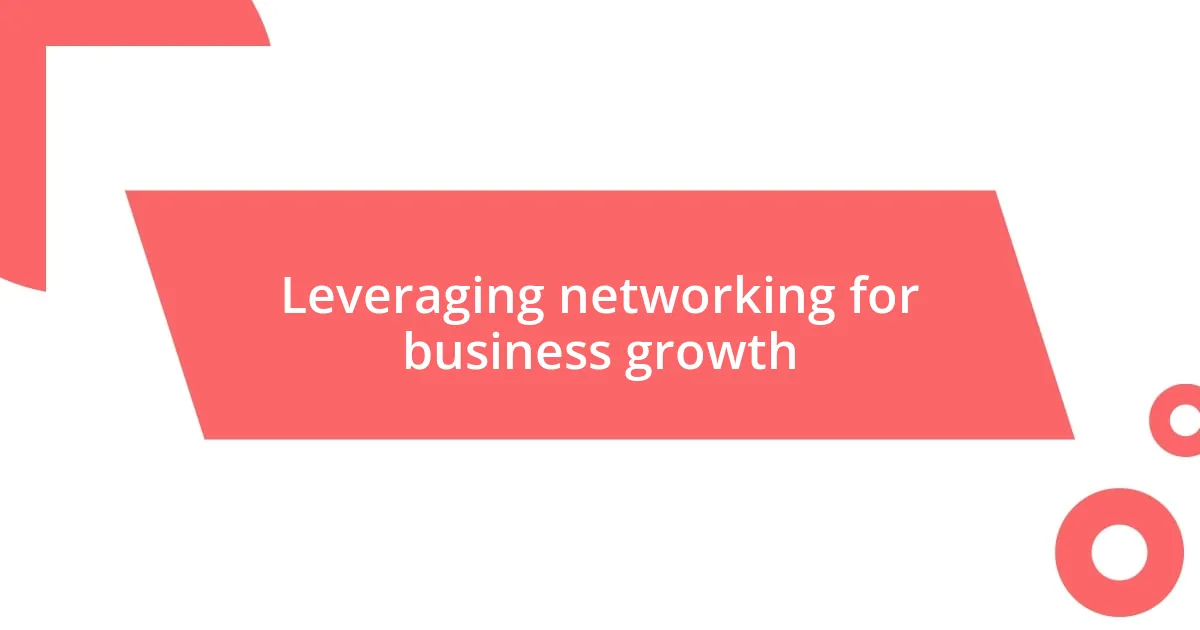
Leveraging networking for business growth
Leveraging networking for business growth is more than just exchanging business cards; it’s about cultivating relationships that drive opportunities. I once attended a local business meetup where I connected with a vendor in the tech space. During our chat, we discovered shared challenges in reaching a target market. This moment sparked an idea for a joint promotional effort that ultimately boosted both our businesses. Have you experienced that exhilarating moment when collaboration ideas ignite just from a conversation?
What truly stands out in these connections is the power of authenticity. When networking, I always strive to be genuinely curious about the other person’s work. For instance, I volunteered to help a vendor with a small project, which not only showcased my skills but also built trust. This small act led to them referring me to other potential clients. How often have you seen a simple gesture turn into a significant opportunity?
Moreover, I’ve learned that staying in touch is key to nurturing these relationships. After a successful partnership with a vendor, I made it a point to send them a holiday card each year. This small touchpoint kept our conversation flowing and reminded them of our past collaboration. It’s amazing how these little efforts can solidify your place in someone’s business network. Do you think consistent engagement can help you convert a fleeting connection into a lasting alliance? I certainly believe it can transform your business trajectory.










